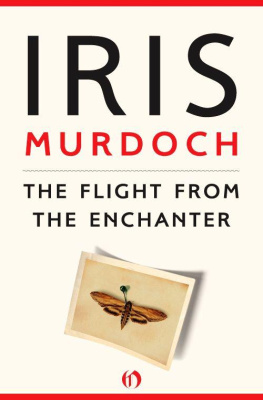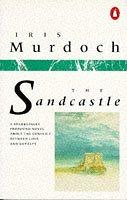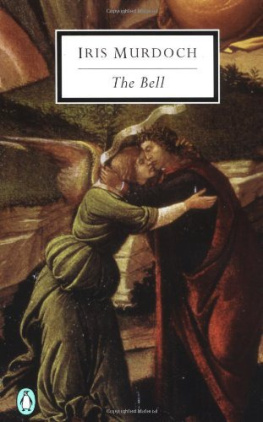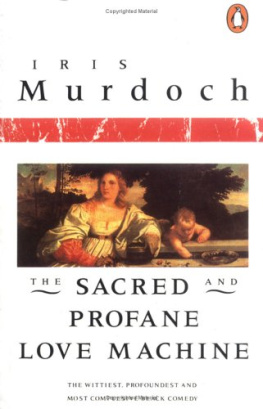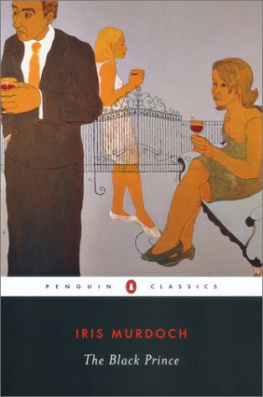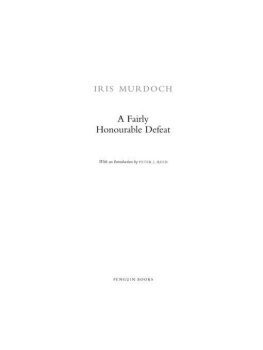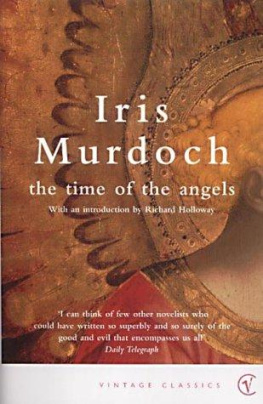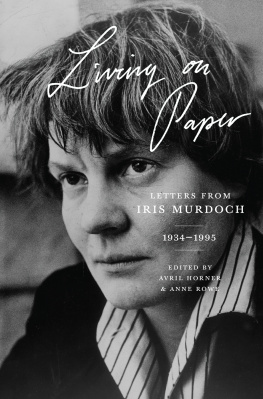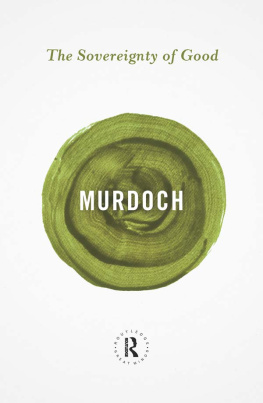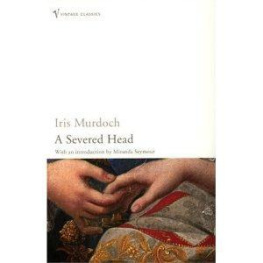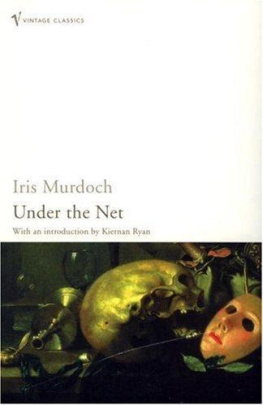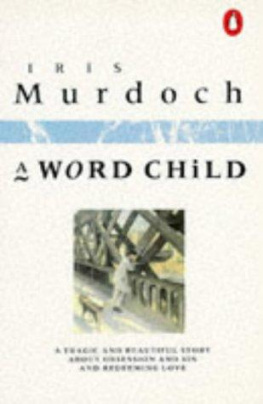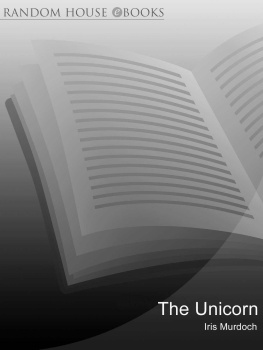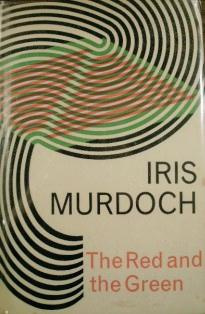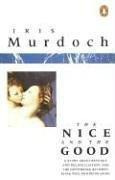Iris Murdoch - The Flight from the Enchanter
Here you can read online Iris Murdoch - The Flight from the Enchanter full text of the book (entire story) in english for free. Download pdf and epub, get meaning, cover and reviews about this ebook. year: 2010, publisher: Open Road, genre: Art / Prose. Description of the work, (preface) as well as reviews are available. Best literature library LitArk.com created for fans of good reading and offers a wide selection of genres:
Romance novel
Science fiction
Adventure
Detective
Science
History
Home and family
Prose
Art
Politics
Computer
Non-fiction
Religion
Business
Children
Humor
Choose a favorite category and find really read worthwhile books. Enjoy immersion in the world of imagination, feel the emotions of the characters or learn something new for yourself, make an fascinating discovery.
- Book:The Flight from the Enchanter
- Author:
- Publisher:Open Road
- Genre:
- Year:2010
- Rating:3 / 5
- Favourites:Add to favourites
- Your mark:
- 60
- 1
- 2
- 3
- 4
- 5
The Flight from the Enchanter: summary, description and annotation
We offer to read an annotation, description, summary or preface (depends on what the author of the book "The Flight from the Enchanter" wrote himself). If you haven't found the necessary information about the book — write in the comments, we will try to find it.
The Flight from the Enchanter — read online for free the complete book (whole text) full work
Below is the text of the book, divided by pages. System saving the place of the last page read, allows you to conveniently read the book "The Flight from the Enchanter" online for free, without having to search again every time where you left off. Put a bookmark, and you can go to the page where you finished reading at any time.
Font size:
Interval:
Bookmark:

THE FLIGHT FROM
THE ENCHANTER
Iris Murdoch

To Elias Canetti
CONTENTS
IT was about three oclock on a Friday afternoon when Annette decided to leave school. An Italian lesson was in progress. In an affected high-pitched voice the Italian tutor was reading aloud from the twelfth canto of the Inferno. She had just reached the passage about the Minotaur. Annette disliked the Inferno. It seemed to her a cruel and unpleasant book. She particularly disliked the passage about the Minotaur. Why should the poor Minotaur be suffering in hell? It was not the Minotaurs fault that it had been born a monster. It was Gods fault. The Minotaur bounded to and fro in pain and frustration, Dante was saying, like a bull that has received the death blow. Partite, bestia! said the mincing voice of the Italian tutor. She was an Englishwoman who had done a course on Italian civilization in Florence when she was young. Virgil was speaking contemptuously to the Minotaur. Annette decided to go. I am learning nothing here, she thought. From now on I shall educate myself. I shall enter the School of Life. She packed her books up neatly and rose. She crossed the room, bowing gravely to the Italian tutor, who had interrupted her reading and was looking at Annette with disapproval. Annette left the room, closing the door quietly behind her. When she found herself outside in the heavily carpeted corridor, she began to laugh. It was all so absurdly simple, she could not imagine why she had not thought of it long ago. She crossed the corridor with a skip and a jump, making a tasteful vase of flowers rock upon its pedestal, and went down the steps to the cloakroom three at a time.
The Ringenhall Ladies College was an expensive finishing-school in Kensington which taught to young women of the debutante class such arts as were considered necessary for the catching of a husband in one, or at the most two, seasons. The far-sighted mammas of the social group from which Ringenhall recruited its pupils were not by any means as rich as they used to be, and they wanted quick results. Ringenhall was geared to the production of those results with the stringency of a military operation. Annette had been a pupil at Ringenhall for about six months. Her father, who was a diplomat, wanted her to come out in London, and had taken the view that a short period at an establishment of this kind would produce in his cosmopolitan ragamuffin, as he called Annette, sufficient of the surface of a young English lady for him to be able to pass her off as such during the social season which he felt to be a necessary part of her upbringing, if not exactly its crown. Andrew Cockeyne, who had not lived in England himself since he was twenty-three, and indeed thoroughly disliked the place, which he found, though he would not have admitted it, both tedious and oppressive, had nevertheless taken care to send his son to his own public school. Annettes education, which was less important, and in the course of which she had learnt four languages and little else, had been picked up un pen partout; but it was essential in her fathers view that it should reach its climax in no other place than London. Annettes mother, who was Swiss, had spread out her hands and assented to this arrangement, and if she had felt any scepticism about it she had kept it to herself.
Annette was nearly nineteen. Concerning Ringenhall she herself had not experienced a single moment of doubt. She had loathed it from the very first day. For her fellow-pupils she felt a mixture of pity and contempt, and for her teachers, who were called tutors, contempt unmixed. For the headmistress, a Miss Walpole, she felt a pure and disinterested hatred. Disinterested, because Miss Walpole had never behaved unpleasantly to Annette or indeed paid any attention to her whatsoever. Annette had never hated anyone in this way before and took pride in the emotion, which she felt to be a sign of maturity. Against the Ringenhall curriculum she had fought with unremitting obstinacy, determined not to let a single one of the ideas which it purveyed find even a temporary lodgement in her mind. When it was possible, she read a book or wrote letters in class. When this was not possible, she pursued some lively daydream, or else fell into a self-induced coma of stupidity. To do this she would let her jaw fall open and concentrate her attention upon some object in the near vicinity until her eyes glazed and there was not a thought in her head. After some time, however, she discontinued this practice, not because the tutors began to think that she was not right in the head this merely amused her but because she discovered that she was able by this means to make herself fall asleep, and this frightened her very much indeed.
Annette put her coat on and was ready to go. But now when she reached the door that led into the street she paused suddenly. She turned round and looked along the corridor. Everything seemed the same; the expensive flora, the watery reproductions of famous paintings, the much admired curve of the white staircase. Annette stared at it all. It looked to her the same, and yet different. It was as if she had walked through the looking-glass. She realized that she was free. As Annette pondered, almost with awe, upon the ease with which she had done it, she felt that Ringenhall had taught her its most important lesson. She began to walk back, peering through doorways and touching objects with her fingers. She half expected to find new rooms hidden behind familiar doors. She wandered into the library.
She entered quietly and found that as usual the room was empty. She stood there in the silence until it began to look to her like a library in a sacked city. No one owned these books now. No one would come here again; only after a while the wall would crumble down and the rain would come blowing in. It occurred to Annette that she might as well take away one or two books as souvenirs. Volumes were not arranged in any particular order, nor were they stamped or catalogued. She examined several shelves. The books were chaotic, but in mint condition, since reading was not a popular activity at Ringenhall. At length she selected a leather-bound copy of the Collected Poems of Browning, and left the room with the book under her arm. She was by now feeling so happy that she would have shouted for joy if it had not been for the delicious spell which she felt herself to be under and which still enjoined silence. She looked about her complacently. Ringenhall was at her mercy.
There were two things which Annette had wanted very much to do ever since she had arrived. One of these was to carve her name on a wooden bust by Grinling Gibbons which stood in the common-room. There was something solemn and florid about this work which made Annette itch for a blade. The wood was soft and inviting. However, she rejected this idea, not because the name of Grinling Gibbons carded, when it came to it, any magic for her but because she had mislaid her pocket-knife. The other thing which she had always wanted to do was to swing on the chandelier in the dining-room. She turned rapidly in the direction of that room and bounded in. Tables and chairs stood by, silent with disapproval. Annette looked up at the chandelier and her heart beat violently. The thing seemed enormously high up and far away. It hung from a stout chain; Annette had noticed this carefully when she had studied it in the past. She had also remarked a strong metal bar, right in the centre of it, on which she had always planned to put her hands. All about and above this bar were suspended tiny drops of crystal, each one glowing with a drop of pure light tinier still, as if a beautiful wave had been arrested in the act of breaking while the sun was shining upon it. Annette had felt sure that if she could swing upon the chandelier the music which was hidden in the crystals would break out into a great peal of bells. But now it seemed to be very hard to get at.
Next pageFont size:
Interval:
Bookmark:
Similar books «The Flight from the Enchanter»
Look at similar books to The Flight from the Enchanter. We have selected literature similar in name and meaning in the hope of providing readers with more options to find new, interesting, not yet read works.
Discussion, reviews of the book The Flight from the Enchanter and just readers' own opinions. Leave your comments, write what you think about the work, its meaning or the main characters. Specify what exactly you liked and what you didn't like, and why you think so.

